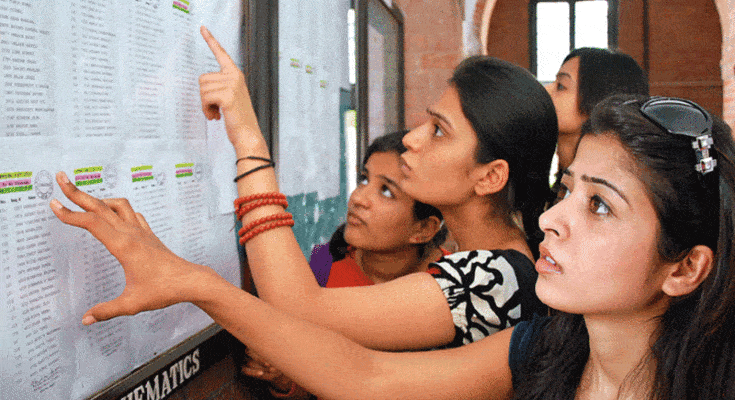The Indian Education system is based upon the traditional methods of face-to-face dissemination of education. With the pandemic hitting and challenging us in all the possible ways, the education needs restructuring to sustain the crisis. The question is how are we going to address the underlying issues to make the system compatible with the on-going predicament?
A thought of the past are those fine winter mornings where we used to get up to our mother’s voices. Then packed our bags, ate our breakfast and headed out for school. From attending those science periods to playing football in every games period, we were accustomed to a certain kind of development. We were never prepared for any other situation where all these could just become a talk of the thin air. Yet, here we are battling a deadly virus from the comforts of our humble abode. The unforeseen outbreak of the COVID-19 disease that is caused by the corona virus has forced the educational institutions to shut. The concept of blended mode or the online Education is not new to the present time but the change from a classical appeal to a more westernized approach has been a little sudden. This situation has kept a challenge before the entire education fraternity of the world and has forced the pedagogues to shift to the online mode overnight. Although, the sheer willingness to gain and impart knowledge has kept the students and the teachers moving through the months, there are quintessential arguments that need our focus to deliver the best in the time of the crisis.
Education system in India was doomed long before the pandemic hit. I’m simply taken aback with the thought that we were expecting them to be efficient online.
-Kenisha, Hindu College, University of Delhi
Every outcome has its pros and cons but if and only if we try to resolve those cons then the solution can turn as the best scenario. Shifting the students and the teacher to the online mode seemed to be a playful and an interesting way out but did it really help when students are slacking off? The Indian educational pattern is more theoretical than practical which makes it difficult for the students to keep up with the classes in the long run. Nevertheless, as students it comes onto us to make some adjustments and do our best to help the situation but a practical approach needs to be harboured eventually. This crisis may cost us other attributes of life. However, the education holds the prime place in a student’s life and the crisis should not cost us the same. The question is not only about engaging the students but also about imparting the same or even better quality of education in such stressful times. So, now the matter at hand is will the long hours of lecture stick to what is written on those ten pages of our book or are we going to find a practical approach to make those hours worth everyone’s time?
From a kid’s perception, it is equally difficult for us to grab things from our home like in DU (we know we will have Open Book Examinations then why to listen? There is no reason.) Same goes with school like students gave exam on Google forms. What is the point of studying huge syllabus?
-Piyush Srivastava, Delhi College of Arts and Commerce, University of Delhi
In addition to the above, arises the question of accessibility and feasibility. India is a polarized nation with a clear distinction between urban and rural. On one hand we have a prospect of better approach towards education by making it real-time and accessible from anywhere but the question of disparities amidst the different sections of societies is inevitable. The urban advancements in the digital arena exceed the underlying issue of the division. While this step might have made our lives easier, about 60% of the students face the unprecedented complications arising from lack of internet connectivity. These figures could widen the gap and have the potential for worsening the status-quo persisting in the nation. This is further fueled by the state’s inaction to ensure accessibility to internet in every region. When the little boy has the responsibility to look after his father’s shop and make time for the book in his hand, the inequitable access to internet would make it difficult for him to accomplish his targets.
I don’t think that our education system was capable for online mode because of the vast digital divide that existed and still exists. Online mode is especially incompatible for the rural areas as compared to the urban areas because of lack of proper infrastructure.
-Srivatsa Seth, Kirori Mal College, University of Delhi
The online mode might be the final solution to our problems in the near future. Before asking the stakeholders to blatantly switch to this sudden change, it is really necessary to answer the question of accessibility and feasibility. Education is the backbone of the world. It is the medium that is going to reel us out of any crisis. Hence, an equitable implementation of internet connectivity in each and every region is the need of the hour in order to maintain the ethical standards of education.
Our education system holds importance for the face value. Eliminating the physicality out of the system, makes the students exposed to the virtual tangibles. Yet, online education is no longer an option for us but a necessity. It might have loopholes but it is on us to make it capable enough to sustain the global catastrophe that we are witnessing. So, the question is, are we going to kneel before this sitch or are we going to join hands and work towards structuring the system in accordance with the present times?
Read Also: Is Covid-19 Making Celebrities Stay in the Same Boat as Us?
Featured Image Credits: Vanessa Rodriguez via Foothill Dragon Press
Ankita Baidya


